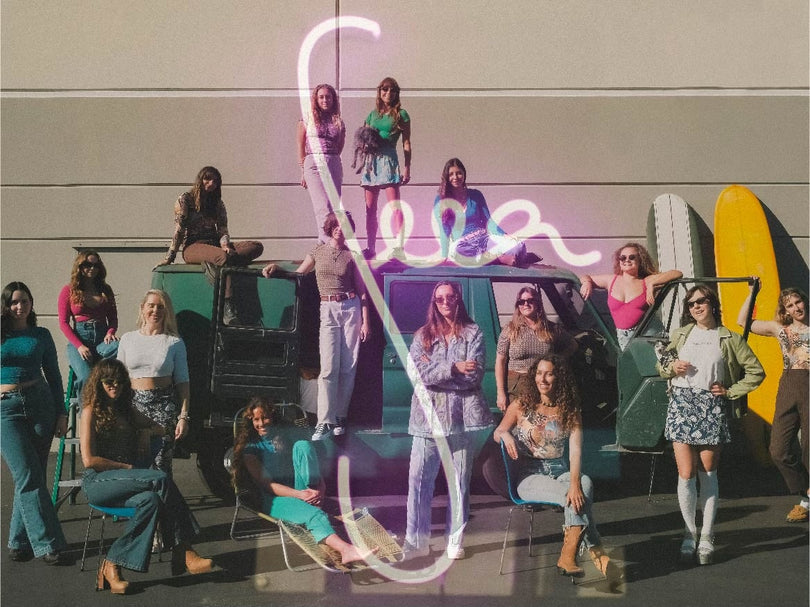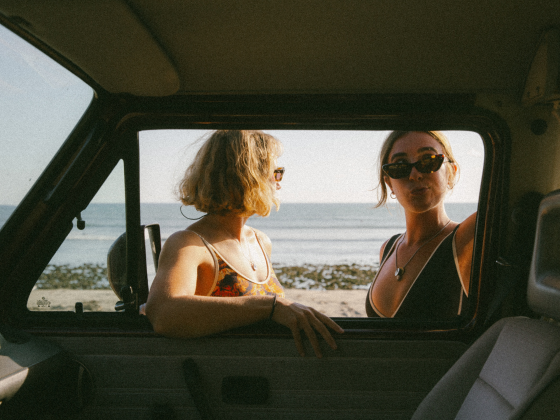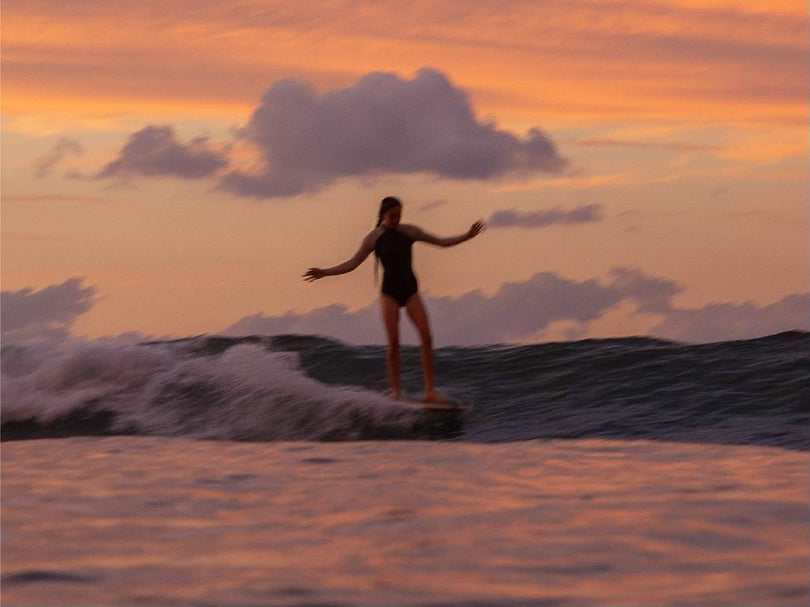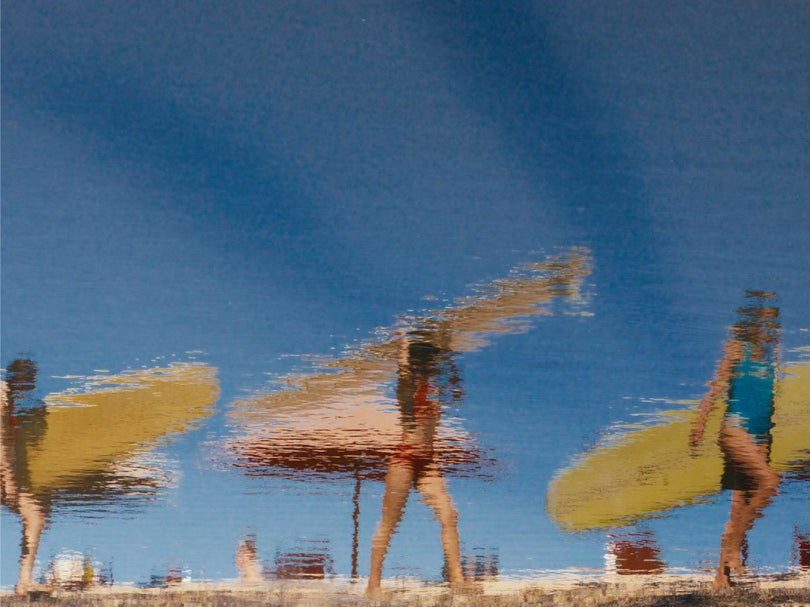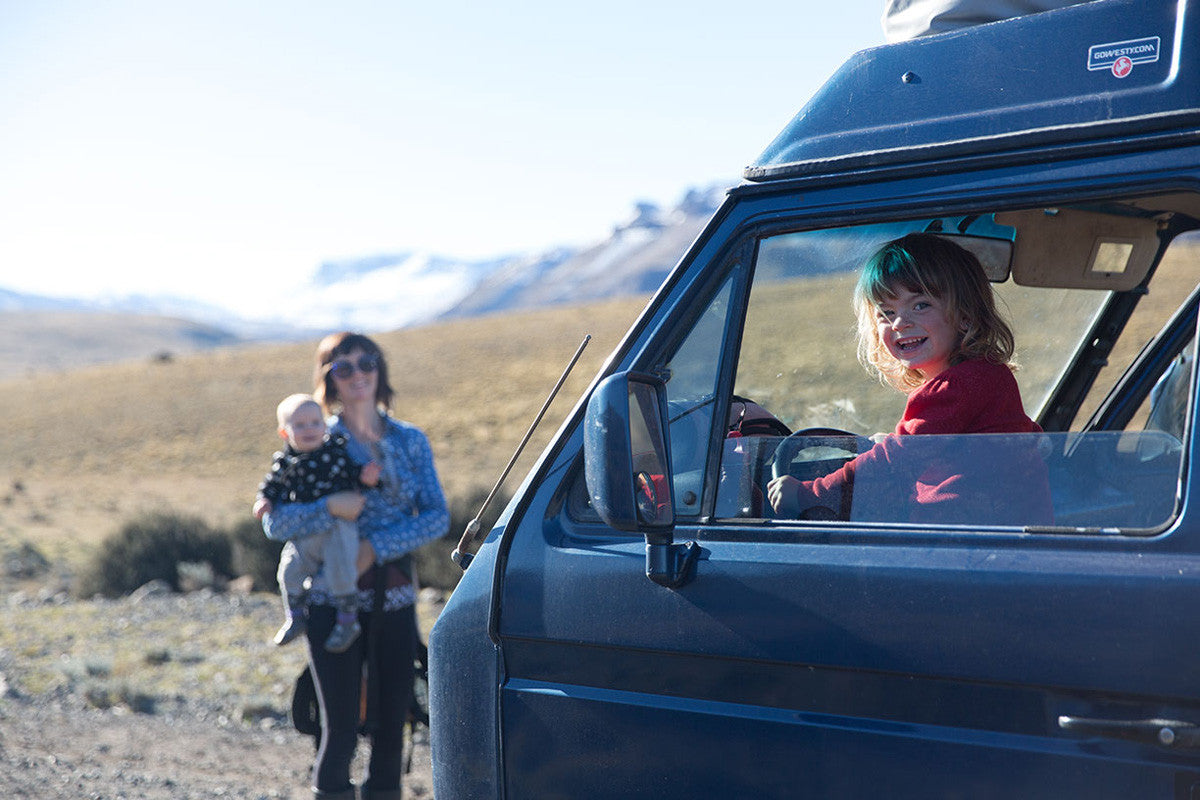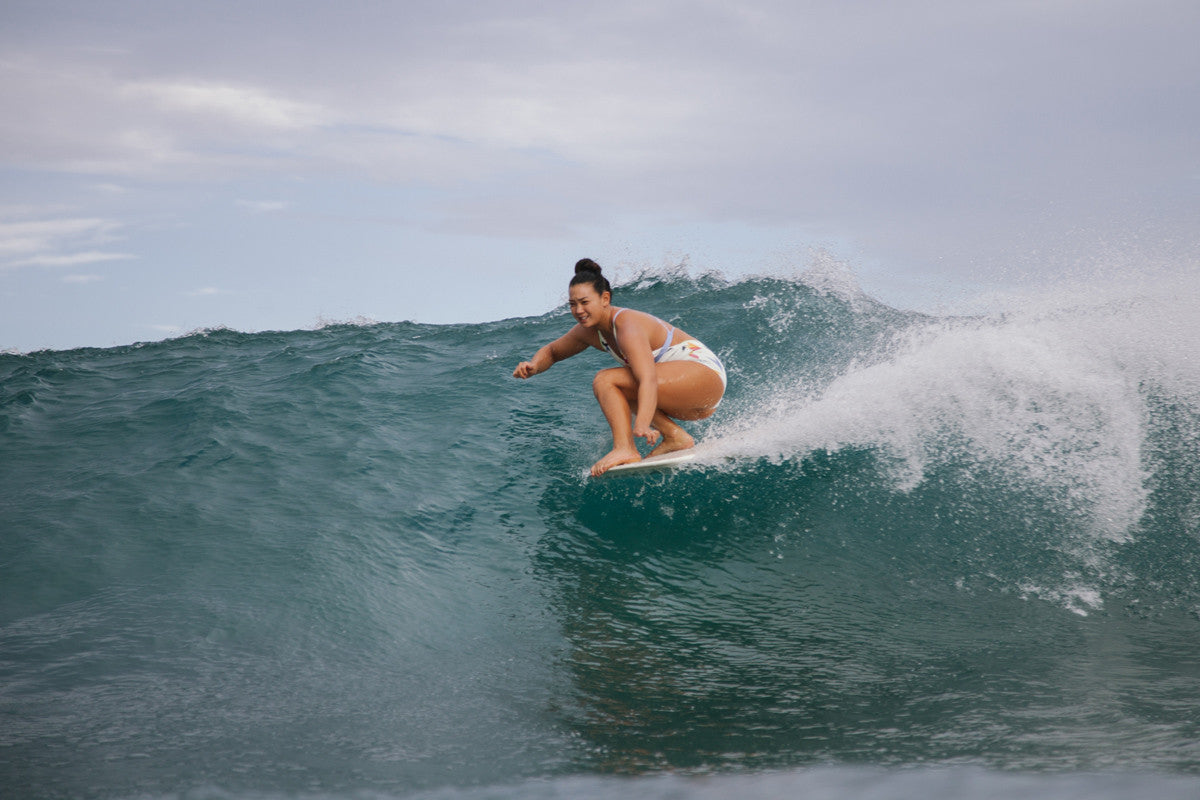Five years ago, the Harteau family of three (Adam, Emily, and Colette) departed from California in their 1990 VW Westfalia T3 with ambitions to travel through Mexico, Central America, and South America to the southern tip of Chile and back to California—all within one year. But nearly halfway through, they decided to follow their biorhythms and intuition instead of a written itinerary. Surrendering to the beautiful unknown future, they have been enjoying life on the slow road ever since and document their journey on their website and Instagram.
Now a family of four—their second daughter Sierra was born in Florianopolis, Santa Catarina, Brazil—"Our Open Road" redefines that home isn’t an address, but being together. We caught up with Emily Harteau about why parenting and motherhood are greatest trips of all.
All images courtesy of OurOpenRoad.com.

What is your usual rhythm of traveling? How do you create consistency and routine for your children while you are traveling?
Emily Harteau: As far as ‘routine,’ that is a thing that neither Adam nor I are predisposed to. Rarely using an alarm, we wake when we do—in cold, wintery places that is later than warm, sunny places. We eat three meals a day when we are hungry, mostly made in the van using fresh local ingredients. As I’ve been writing this interview, we are on a driving day, so I’ve jumped to the back to make many smaller meals for our growing girls. Sliced sweet potatoes (steamed in the pressure cooker last night) topped with local honey, butter and cinnamon, then an hour later, chopped avocado, goat cheese, garbanzo beans and beets with nutritional yeast and walnuts.
Consistency comes in two main forms. We live in our van, so while a bit untraditional, it's our home! The girls have their own closets, favorite toys, and special plates. They know where the spray bottle and dustpan for cleaning up are. This is a steady home environment to ground them, even when where we are parked or driving changes often. When the curtains are drawn, we could be anywhere in the world, and it feels like home. As parents, Adam and I are both a constant in their lives; on the road we are with them 24 hours a day. These two elements allow us to create a solid foundation for exploring the world at large, instilling in them the confidence that we are there to guide and support them.


How long do you usually stay in one place?
Emily: Our twists and turns are determined by many factors—both spontaneous and planned—in the grand scheme and on the daily. Weather and finances help determine what activities we do. Being rigid in a life on the road will surely create disappointment, as controlling the uncontrollable is a futile exertion. So we change course, adapting as the tides do, remaining flexible with what comes. Tuning into the energy of a place, we decide where to camp and how long to stay. We have a loose idea of where we want to be for, say, a season, or we need to be to a certain place to meet someone in three months, so we adjust our course accordingly. Early on we adopted a standing rule that if one of us does not like a campsite, we move, no questions asked. On the road, you are stripped of so many outside filters and your intuition is your best, most vital gift.
For example, as I write this, we are at a mechanic getting our brakes fixed, as we have just crossed the mighty Andes. We had not planned on this half-day adventure, but here we are, so it looks like we will spend another night in Cochabamba, Bolivia. A few weeks ago, we rented a (beautiful!) small house, as we had extensive bodywork done to our home-on-wheels. What was slated to be one week work turned into two, so we accepted the turn of the tides as a gift: high peaks draped with moss and cactus rose above, blossoming flowers and hummingbirds flitting about, an organic garden which the girls help harvest food from daily- mint for tea, tumbo (banana passion fruit) for snacking, chard for dinner.
We are in love with the breadth and diversity we’ve encountered on the road. We adore high mountains and oceans, the cultural delights in big cities and the slow charm of small towns, deep forests and vast deserts. Life on the road suits us quite well, wherever that may be, sometimes for an hour, sometimes for months. 

What values are most important to you as a parent for you to teach your children as you travel through different countries and meet a lot of different people from different cultures?
Emily: Raising our girls on the road and in the world, we hope to raise them as aware, active global citizens who cherish the natural wonders of the world, and have empathy for all living beings. Fostering an environment for asking questions (aka child-led learning) leads to wonderful discussions that link many subjects together. Children are forthright and do not always ask the easy questions!
We share the joys and sorrows of the lives of those we encounter honestly with our children, discussing malnutrition, extinction of species, war, and poverty to their wide-eyed wonder. Of course we filter these heavy topics and guide our discussions, it is impossible to hide the world. It is not a blind freedom to live this life where there is constantly new experiences to absorb. We acknowledge and share with our girls all it has taken for us to have this opportunity. In a world where freedom is an increasingly rare commodity, it is one we relish.
How do you see your children play with local children in the areas where you travel? What types of games or interests connect them?
Emily: Parks are a great place to connect with local kids! Colette’s favorite sentence in Spanish is “¿Quieres jugar?” which means “Do you want to play?” Even when the locals do not speak Spanish (perhaps Quechua, Aymara or Ese-Eja is their native language), there are gestures that are universal. Taking turns on the slide, the merry-go-round, hide-and-go-seek, and of course futbol are all favorite playtime activities. Colette and Sierra have a bag of toys that houses assorted small toys and also smaller bags of building blocks and Legos- if we are not at a playground, these usually come out. Children naturally focus on the similarities rather than differences, tune into their natural curiosity and adapt accordingly. Of course, this in not the case 100% of the time, but that too offers a lesson.


What are your thoughts on formal education and do you plan on settling down for them to enroll in school in the states?
Emily: Traditional education provides a great service for many, but is only as strong as the lowest common denominator. For now, we are living a different kind of learning path that diverges from the antiquated industrialized learning institution.
Education is very important to Adam and I; we are life learners, searching to absorb all we can from these rich experiences we are sharing as a family. For us, there is not a limitation of four walls that dictate a time to ‘sit and learn’- that mentality is so narrow, and the world is so wide! Adam and I had radically different experiences in school but we both agree that the teachers we had and the support available to us in those experiences were crucial to our access to education. We work to foster an environment for asking questions through child-led learning, which in turn leads to many wonderful discussions that link many subjects together. As Americans, we have many options for schooling our children and we will continue to “world school” the girls as we travel long-term. We spend more time outdoors, less time with screens, more time doing, less time commuting, and weaving these experiences together.
How do you feel that you’ve changed as a person after becoming a mother, during which you embarked on a new nomadic lifestyle?
Emily: What changes when you become a mother? Well, for one, you are no longer one. In a marriage you have an equal, a teammate, a soulmate- you are two weights seeking balance on a continually sliding scale of life. But you remain essentially you.
As a mother, you are a provider. Of love, of sustenance from your own body day and night, of comfort, of clean clothes, of interpreting dreams good and bad, of trimming hair, of wiping butts. There is nothing equal about it, you must be in charge or chaos will melt into despair. It is a complicated thing to be a parent, but if we can multi-task 15 things as only a woman’s brain can do so well, then surely turning down the volume of ones own-ness without fear of losing completely who we are in order to tune into the other channels, some blaring, some whispering, so that you can hear each beat and work to orchestrate a symphony of all the voices each with their individual needs and strengths, is a task we can master with joy as well. And it is enough. Yes, I am ME. Me as I was before I had children, but I am also more that that. I am my children, I am what I have taught them, what they will be. I do not expect to remain the same, I am forever changed, I am fearless to give my whole heart into raising these people whom I am gifted with that charge. I am Emily, but I am also, proudly, Mama.
To be a parent, is to take the greatest trip of your life. You get the opportunity to craft a citizen of the planet, influence the future beyond yourself, to mold a child with your words and what you put before them, fill their minds with what information you present them, what memories you make with them. To process the highlights of your own youth and forge a parental path to share moments that will glimmer or create a stone in their larger foundation. What a gift, what a challenge, what a trip.

How does it feel to watch them grow up and see them experience all these beautiful places in the world with you?
Emily: Parenting on the road (and in life) gives Adam and I the deepest joy. Having lost our first child Aaro, at birth, we know and intensely rejoice in the gift that is life. From this darkness, we have dedicated our lives to living as fully as we can. We want to spend every possible moment with our daughters and what we have created on the road, sharing nearly all our time with them, teaching them of the wonders of the world through experience in which their total wellness: mind, body, and spirit all, is our top priority. Our previous life in Los Angeles required us to work long hours to make ends meet. Our life on the road as a full-time family honors our past and celebrates our present!


